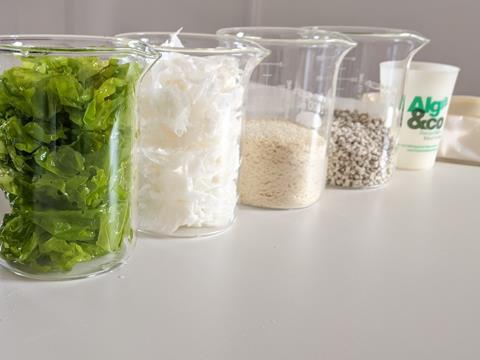
Somater and Eranova have worked together to produce biobased packaging derived from green algae in hopes of replacing fossil-based polymers with an environmentally conscious alternative.
The Somater packaging range utilizes algae sourced in the Étang de Berre and made in France. When combined with polypropylene or polyethylene, these materials are said to result in biobased and recyclable packaging designs.
Also available in the range are 100% biobased combinations and materials incorporating post-consumer recycled content. Eranova claims that ALGX can be recycled, and the partners underline the recyclability of biobased materials as a priority in their operations.
It is hoped that algae cultivation and upcycling will have a positive environmental impact, as it could also help to prevent pollution in nature and on the coast. Algae is said to absorb up to 10 times more CO2 per hectare than forests, meaning its widespread use is expected to lower the carbon footprint of packaging production process and combat climate change.
Eranova adds that standardized life cycle assessments have been conducted to underpin the ‘positive environmental impact’ of its materials. The material has been validated by Somater in injection moulding, blow moulding, extrusion blow moulding, and thermoforming applications and apparently result in durable, functional, and aesthetically pleasing packaging designs.
ALGX also aims to deliver a ‘luxurious tactile experience’ with its ‘velvety and silky’ texture. It is available in a range of colours including white, black, pastel colours, and its natural ‘toffee’ hue. Consumers can customize the decoration of their packaging with screen printing and hot stamping options.
Pots, bottles, caps, closures, and cups made from ALGX by Somater were showcased at Paris Packaging Week in January 2024.
The announcement comes after Caroli Buitenhuis from Green Serendipity recommended biobased materials as a solution to leaking microplastics and low recycling rates in some global regions.
In other recent developments, Neste, Mitsui Chemicals, and its subsidiary Prime Polymer received the Japanese Eco mark for their biobased packaging for Japanese Consumers Co-operative Union (JCCU) brand CO-OP’s dried seaweed slices.
The Dutch Government has also named Notpla’s seaweed-based packaging as a plastic-free material according to the EU Single-Use Plastics Directive.
If you liked this story, you might also enjoy:
The Brief: How viable is biorecycling for plastics?
Report: How the top brands are progressing on packaging sustainability
The Brief: Using ocean-bound plastic in packaging – how, why and should we?













No comments yet